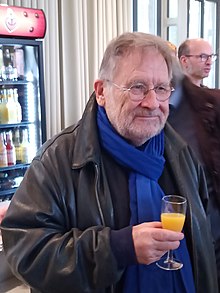Irmin Schmidt (born 29 May 1937)[1] is a German keyboardist and composer, best known as a founding member of the band Can.
Irmin Schmidt | |
|---|---|
 Irmin Schmidt (2022) | |
| Born | 29 May 1937 Berlin, Germany |
| Occupations |
|
| Spouse |
Hildegard Schmidt (m. 1963) |
| Website | irminschmidt |
Biography
editSchmidt was born to Kurt and Margot Schmidt in Berlin, Germany. His father was an architect and engineer, and both his parents played piano. He began his studies in music at the conservatorium in Dortmund, and expanded his education in conducting at the Folkwang Hochschule in Essen, studying under Heinz Dressel. Additionally, he took a piano lessons from Detlef Kraus and studied composition under the Hungarian avant-garde composer György Ligeti. Schmidt started work mainly as a conductor and performed in concerts with the Bochum Symphony, the Vienna Symphony, and the Dortmund Ensemble for New Music, which he founded in 1962. During this time, Schmidt conducted the West German premiere of John Cage's "Atlas Eclipticalis" with Bochum Symphony Orchestra and performed Cage's piano piece "Winter Music".[2]
Schmidt attended the Mozarteum in Salzburg, Austria to further develop his conducting skills under István Kertész. In 1964-1965, Schmidt attended up for the Cologne Courses for New Music at the Rheinische Musikschule in Cologne, taught by Karlheinz Stockhausen, Luciano Berio, Henri Pousseur, and Earle Brown, the course which was also attended by his future band-mates, Holger Schüring and David C. Johnson.[3][4] By 1966 Schmidt got a position as Kapellmeister at the Theater Aachen, hired as docent for musical theatre and chanson, and worked at the Schauspielschule Bochum (drama school) teaching vocal technique.[5]
On a number of occasions, Irmin was asked to give talks or perform avant-garde music at gallery openings organized by Albert Schulze-Vellinghausen . Schulze-Vellinghausen, in turn, acquainted Schmidt with interior designer and up-in-coming gallerist Hans Mayer.[6]
In 1968, Schmidt founded the experimental krautrock band Can with Holger Czukay, Michael Karoli, and Jaki Liebezeit. Schmidt served as Can's keyboardist until the group's disbandment in 1979. He participated in both reunions of Can, in 1986 and 1991.
Schmidt has scored more than 40 films and television programs, including Knife in the Head (1978) and Palermo Shooting (2008). He has recorded a few solo albums and written an opera, Gormenghast, based on Mervyn Peake's Gormenghast Trilogy. Gormenghast premiered at the Opernhaus Wuppertal in 1998. Excerpts from the work were released on Spoon Records in 1999.[7] His wife Hildegard Schmidt has been responsible for Can's management and record label, Spoon Records, since the 1972.[8]
As of 2008, Schmidt lived in Southern France. His interests outside music include cooking.[9] In 2015, he received the Ordre des Arts et des Lettres (Chevalier).[10]
In 2018, Schmidt and British writer and editor Rob Young published a book on Can entitled All Gates Open: The Story of Can.[8]
Following the death of Can's second lead vocalist Damo Suzuki in February 2024, Schmidt is one of the last surviving members of the band's classic lineups, alongside original vocalist Malcolm Mooney.
Personal life
editIrmin Schmidt began a relationship with Hildegard Reittenberger after performing at the East German music festival in 1957. The couple got married six years later in 1963.[11]
Discography
editSolo
edit- Filmmusik (1980)
- Filmmusik, Vol. 2 (1981)
- Toy Planet (1981) with Bruno Spoerri
- Filmmusik, Vols. 3 & 4 (1983)
- Rote Erde (1983) soundtrack
- Musk at Dusk (1987)
- Filmmusik Vol. 5 (1989)
- Impossible Holidays (1991)
- Soundtracks 1978–1993 (1994)
- Gormenghast (2000)
- Masters of Confusion (2001) with Kumo
- Flies, Guys and Choirs (2008) DVD with Kumo
- Axolotl Eyes (2008) with Kumo
- Palermo Shooting (2008) soundtrack
- Filmmusik Anthology, Volume 4 & 5 (2009)
- Villa Wunderbar (2013), 2-CD compilation, sleeve notes by Wim Wenders[12]
- Filmmusik Anthology Volume 6 (2015)
- 5 Klavierstücke (2018)
- Nocturne (Live at Huddersfield Contemporary Music Festival) (2020)
With Can
editBibliography
edit- Young, Rob; Schmidt, Irmin (2018). All Gates Open: The Story of Can. London: Faber and Faber. ISBN 978-0571311491.
Videography
editReferences
edit- ^ Colin Larkin, ed. (1992). The Guinness Encyclopedia of Popular Music (First ed.). Guinness Publishing. p. 2203. ISBN 0-85112-939-0.
- ^ Young & Schmidt 2018, p. 19.
- ^ Karlheinz Stockhausen. Dieter Schnebel (ed.). Texte zur Musik 3: 1963–1970. DuMont Dokumente (Cologne: M. DuMont Schauberg). pp. 196–211. ISBN 978-3-7701-0493-2.
- ^ Young & Schmidt 2018, pp. 23–24.
- ^ Young & Schmidt 2018, p. 28.
- ^ Young & Schmidt 2018, p. 21-22.
- ^ "Gormenghast - A fantasy opera by Irmin Schmidt". Spoon Records. Retrieved 17 July 2013.
- ^ a b Young & Schmidt 2018.
- ^ "Features | Things I Have Learned | Irmin Schmidt of Can on Food And Cooking (Plus A Recipe Tip)". The Quietus. 2 December 2008.
- ^ Severin Mevissen (3 February 2015). "Can: Irmin Schmidt erhält Ritterschlag". Rolling Stone (Germany) (in German).
- ^ Young & Schmidt 2018, pp. 18–19.
- ^ Villa Wunderbar at AllMusic